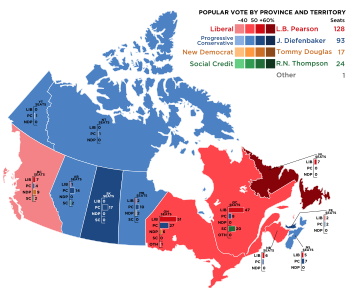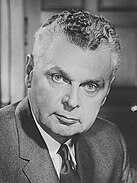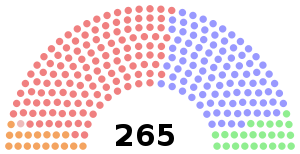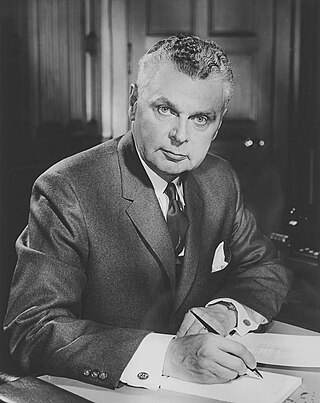
John George Diefenbaker was the 13th prime minister of Canada, serving from 1957 to 1963. He was the only Progressive Conservative party leader between 1930 and 1979 to lead the party to an election victory, doing so three times, although only once with a majority of the seats in the House of Commons.

The Progressive Conservative Party of Canada was a centre to centre-right federal political party in Canada that existed from 1942 to 2003.

The 1993 Canadian federal election was held on October 25, 1993, to elect members to the House of Commons of the 35th Parliament of Canada. Considered to be a major political realignment, it was one of the most eventful elections in Canada's history. The governing Progressive Conservatives suffered a spectacular wipeout, losing 154 of their 156 seats in one of the worst-ever defeats for a governing party in the Western world. The Liberal Party under Jean Chrétien won a majority government with 177 seats, with the separatist Bloc Québécois achieving and western-based Reform Party came second and third, with the Bloc's 54 seats making it the Official Opposition thanks to the devastation of the PCs.

The 1988 Canadian federal election was held on November 21, 1988, to elect members to the House of Commons of Canada of the 34th Parliament of Canada. It was an election largely fought on a single issue: the Canada–United States Free Trade Agreement (CUSFTA); the Progressive Conservative Party campaigned in favour of it whereas the Liberal Party and the New Democratic Party (NDP) campaigned against it.

The 1972 Canadian federal election was held on October 30, 1972, to elect members of the House of Commons of Canada of the 29th Parliament of Canada. It resulted in a slim victory for the governing Liberal Party led by Prime Minister Pierre Trudeau, which won 109 seats, compared to 107 seats for the opposition Progressive Conservatives led by Robert Stanfield. Trudeau's Liberals experienced a decline in support as a result of rising unemployment.

The 1984 Canadian federal election was held on September 4, 1984, to elect members to the House of Commons of the 33rd Parliament of Canada.
The Progressive Conservative Association of Alberta was a provincial centre-right party in the Canadian province of Alberta that existed from 1905 to 2020. The party formed the provincial government, without interruption, from 1971 until the party's defeat in the 2015 provincial election under premiers Peter Lougheed, Don Getty, Ralph Klein, Ed Stelmach, Alison Redford, Dave Hancock and Jim Prentice. At 44 years, this was the longest unbroken run in government at the provincial or federal level in Canadian history.

The Social Credit Party of Canada, colloquially known as the Socreds, was a populist political party in Canada that promoted social credit theories of monetary reform. It was the federal wing of the Canadian social credit movement.
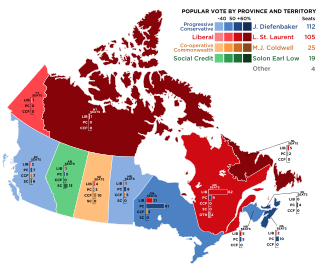
The 1957 Canadian federal election was held June 10, 1957, to select the 265 members of the House of Commons of Canada of the 23rd Parliament of Canada. In one of the greatest upsets in Canadian political history, the Progressive Conservative Party, led by John Diefenbaker, brought an end to 22 years of Liberal rule, as the Tories were able to form a minority government despite losing the popular vote to the Liberals.

The 1968 Canadian federal election was held on June 25, 1968, to elect members of the House of Commons of Canada of the 28th Parliament of Canada.

Howard Charles Green, was a Canadian federal politician.

The 1980 Canadian federal election was held on February 18, 1980, to elect members of the House of Commons of Canada of the 32nd Parliament of Canada. It was called when the minority Progressive Conservative government led by Prime Minister Joe Clark was defeated in the Commons.

The 1974 Canadian federal election was held on July 8, 1974, to elect members of the House of Commons of Canada of the 30th Parliament of Canada. The governing Liberal Party was reelected, going from a minority to a majority government, and gave Prime Minister Pierre Trudeau his third term. The Progressive Conservatives, led by Robert Stanfield, did well in the Atlantic provinces, and in the West, but Liberal support in Ontario and Quebec ensured a majority Liberal government.

During the history of Canadian politics, thirteen minority governments have been elected at the federal level. There have also been two minority governments resulting from governments being replaced between elections, for a total of fifteen federal minority governments in thirteen separate minority parliaments. There have been historical cases where the governing party had fewer than half of the seats but had the support of independents who called themselves members of the party; these cases are not included, as there was never any serious chance of the government falling.

The 1958 Canadian federal election was held to elect members of the House of Commons of Canada of the 24th Parliament of Canada on March 31, 1958, just nine months after the 23rd election. It transformed Prime Minister John Diefenbaker's minority into the largest majority government in Canadian history and the second largest percentage of the popular vote. Although the Tories would surpass their 1958 seat total in the 1984 election, the 1958 result remains unmatched both in terms of percentage of seats (78.5%) and the size of the Government majority over all opposition parties. Voter turnout was 79.4%.
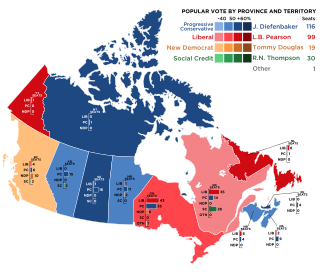
The 1962 Canadian federal election was held on June 18, 1962, to elect members of the House of Commons of Canada of the 25th Parliament of Canada. The governing Progressive Conservative (PC) Party won a plurality of seats in this election, and its majority government was reduced to a minority government.
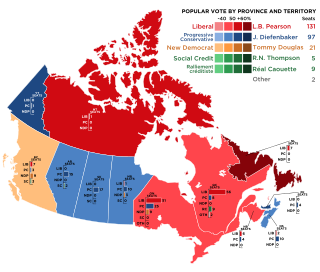
The 1965 Canadian federal election was held on November 8, 1965 to elect members of the House of Commons of Canada of the 27th Parliament of Canada. The Liberal Party of Prime Minister Lester B. Pearson was re-elected with a larger number of seats in the House. Although the Liberals lost a small share of the popular vote, they were able to win more seats, falling just short of a majority.

Gordon Minto Churchill, was a Canadian politician. He served in the Legislative Assembly of Manitoba from 1946 to 1949 as an independent, and in the House of Commons of Canada from 1951 to 1968 as a Progressive Conservative. He served in the cabinet of Prime Minister John Diefenbaker.
